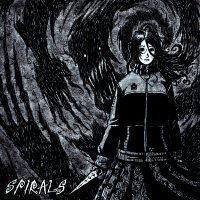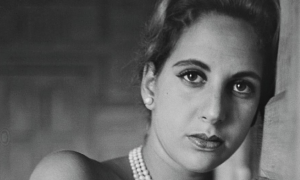Home » Jazz Articles » Book Excerpts » Go Slow: The Life Of Julie London
Go Slow: The Life Of Julie London
 In 1965, after three years of largely recording pop tunes under Liberty Records' hit-making producer Snuff Garrett, Julie London was eager to return to the types of songs—and the style of singing—which had brought her fame and success a decade earlier with her debut album, Julie Is Her Name, and its stand-out track, "Cry Me a River."
In 1965, after three years of largely recording pop tunes under Liberty Records' hit-making producer Snuff Garrett, Julie London was eager to return to the types of songs—and the style of singing—which had brought her fame and success a decade earlier with her debut album, Julie Is Her Name, and its stand-out track, "Cry Me a River." The marketing budget for Julie London's records had been on the decline for years, but label executives were aware that they still needed a diverse collection of artists to fill a broad catalog of musical styles. She was a safe, reasonably inexpensive bet, and she continued to turn out product that brought in a steady, if unspectacular, rate of return. The arrangement also had advantages for her; singers of higher reputation than Julie had been axed from the rosters of large record companies like Capitol and Columbia in recent years, so it was more likely that she could fly under the radar and ride out the turbulence roiling the music business if she remained with a lesser label like Liberty.
Fortunately, there was still a profitable niche for jazz recordings in the mid-1960s—at least for those with a good melody. (
Vince Guaraldi
piano1928 - 1976
Ramsey Lewis
piano1935 - 2022
Gerry Mulligan
saxophone, baritone1927 - 1996
Chet Baker
trumpet and vocals1929 - 1988
Gerald Wilson
composer / conductor1918 - 2014
Dick Bock's arrival at Liberty had an immediate impact on Julie London's career. When Snuff Garrett resigned to go into independent production, Bock became the conduit through which the singer returned to more familiar, comfortable sonic settings. The decision to record the types of songs she wanted to record—and less of the material picked by A&R men looking for hits—gave Julie the opportunity to create a series of albums over the next three years that were produced by adults for adults. The two discs she made with Bock—the big-band bash Feeling Good and the cool, nocturnal Cole Porter tribute All Through the Night—became the templates for an unlikely resurgence in what had become a moribund recording career.
Feeling Good, which paired Julie with the explosive sound of Gerald Wilson's big band, was released—somewhat ironically—as tensions ran high in August 1965 following the devastating riots in the black Los Angeles neighborhood of Watts. It was her most energetic studio work in years. A raucous rendition of
Herbie Hancock
pianob.1940
Bobby Troup
piano1918 - 1999
* The version of "Summertime" Stacy suggested may have been the recording by the British band the Zombies, which had been released in early 1965.
One notable reason for the success of Feeling Good was the welcome inclusion of two new songs by Bobby Troup, whose name had been conspicuously absent from all but one of his wife's records during the Snuff Garrett years. Troup's lack of musical output during the early 1960s was mirrored by many other songwriters of his and earlier generations who had been left in the commercial dust when, rather than rely on outside writers, Bob Dylan and the musical teams of Lennon and McCartney and Jagger and Richards opted to write and record material that reflected the thoughts and opinions of their own generation.
The minor-key swinger "Won't Someone Please Belong to Me" was composed during the spring of 1964 when Julie was performing at the Americana Hotel in Manhattan. Julie enjoyably stays behind the beat of the Basie-style arrangement of a song Bobby reluctantly admitted was the first he had written in years. "Girl Talk" was his witty lyrical companion to composer Neal Hefti's melody for the recent film biopic of Hollywood siren Jean Harlow. It was paired with the other Troup song as the album's sole single; although it never reached the charts, "Girl Talk" quickly became an audience favorite and stayed in his wife's act for years.
A satire on the daily lifestyle of the prototypical suburban housewife, "Girl Talk" also appears to hold clues to Julie's feelings about women. She "adored very few people," particularly other women, said a friend. But "if she loved you, then she wanted you to be around a lot." She had little time for anyone who fawned over her. The women who made up her circle of close friends "had a sense of humor, and would laugh at her jokes." San Bernardino schoolmate Caroline Woods, Dorothy Gurnee, Theda Golden (her doctor's wife), and Linda Wheeler (the wife of Jim Wheeler, one of Julie's backup singers during the last few years of her career), were among the women Julie called her "buddies." As traveling companions for Julie and babysitters for her children, it could be tremendous fun: top-flight lodgings, great food and drink, and the bonus of hobnobbing with celebrities. Yet if Julie felt that a woman had done her wrong, there was "no forgiving."
"Girl Talk" also comments on the relationship between Julie and Bobby Troup. Their drawn-out years of dating and the on-again, off-again engagement had by 1965 settled into a comfortable marriage. They were an "engaging pair," devoted to each other, to their large family, their dogs, and their shared love of good music. Yet they were very different people, each marked by personality traits that set them apart from each other. Bobby was essentially upbeat, a gregarious entertainer who was always ready to perform; "generous, funny, kind, witty," in the words of his younger daughter Ronne. Julie was, to a large degree, "inside of herself." She didn't always need—or welcome—Bobby's so obvious adoration and worship. While she was "forever grateful" for his willingness to step up and be so clearly devoted to Stacy and Lisa, one friend was certain that Julie's "insecurities and lack of self-esteem went over into everything," including her relationship with Bobby. "She liked to yell at him. She got a lot of stuff out just yelling at Bobby, because he could take it, and it didn't bother him. He wanted to please her, no matter what it took, and she knew that, she took advantage of it."
...
All Through the Night followed a few months after Feeling Good. The idea for a tribute to the late Cole Porter came from the album's producer, and the record's featured soloist, alto saxophonist
Bud Shank
saxophone1926 - 2009
Russ Freeman
piano1926 - 2002
The Porter collection remains one of her strongest, most jazz-oriented recordings (a "sultry and sophisticated" romp through the songwriter's catalog, according to Billboard). Her floating, slurring, sensual voice is complemented by the expert musicianship of Shank, Freeman, guitarist Joe Pass, bassist Monty Budwig, and drummer Colin Bailey, who said that Julie "could [have been] a jazz singer, if she wanted to." Bailey recalled that the sessions went smoothly for the most part, although the singer had "a few nips from her flask, and by the end of the second date, she was a little juiced." When the producer tried to give her some advice from the control booth, she quickly told him to "fuck off!"
Pure sexuality was evoked by the glacial pace and whispered ecstasy of the title song. "Projecting sex" was a significant component of Julie's image. "When she got in a low-cut gown and started singing that breathy-quality kind of sound, it was just sex in a bottle."
Joe Pass
guitar1929 - 1994
Colin Bailey
drums1934 - 2021
Tags
Book Excerpts
Michael Ricci
Vince Guaraldi
Ramsey Lewis
Gerry Mulligan
Chet Baker
Gerald Wilson
Los Angeles
Herbie Hancock
Bobby Troup
Bud Shank
Russ Freeman
Joe Pass
Colin Bailey
Go Slow
Julie London
PREVIOUS / NEXT
Support All About Jazz
 All About Jazz has been a pillar of jazz since 1995, championing it as an art form and, more importantly, supporting the musicians who make it. Our enduring commitment has made "AAJ" one of the most culturally important websites of its kind, read by hundreds of thousands of fans, musicians and industry figures every month.
All About Jazz has been a pillar of jazz since 1995, championing it as an art form and, more importantly, supporting the musicians who make it. Our enduring commitment has made "AAJ" one of the most culturally important websites of its kind, read by hundreds of thousands of fans, musicians and industry figures every month.

















 Listen
Listen

 Listen
Listen





















